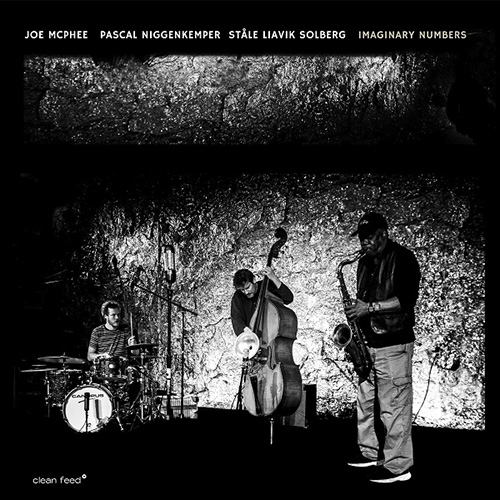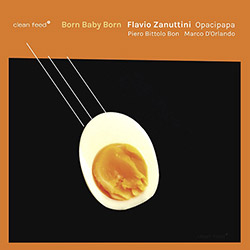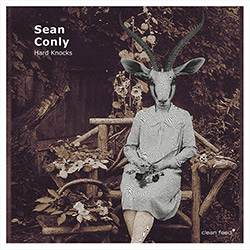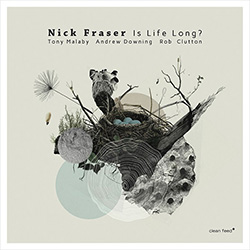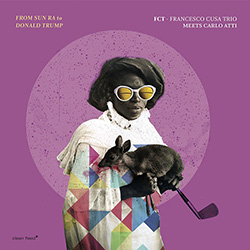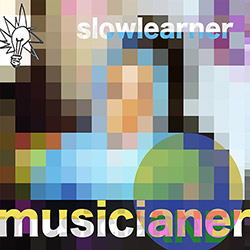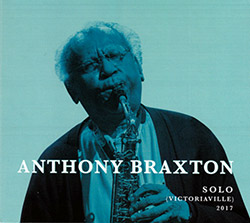
Playing both pocket trumpet and tenor sax, Joe McPhee joins German/French/NY bassist Pascal Niggenkemper, and Norwegian drummer Stale Liavik Solberg, for an authoritative and bold album of collective free improv, three extended conversations that center on "A Supreme Love (For John Coltrane)", pointing to the history and sympathies of these impressive musicians.
Out of Stock
Quantity in Basket: None
Log In to use our Wish List
Shipping Weight: 2.00 units
Sample The Album:
Joe McPhee-pocket trumpet saxophone, tenor saxophone
Pascal Niggenkemper-double bass
Stale Liavik Solberg-drums, percussion
Click an artist name above to see in-stock items for that artist.
UPC: 5609063004557
Label: Clean Feed
Catalog ID: CF455
Squidco Product Code: 25210
Format: CD
Condition: New
Released: 2017
Country: Portugal
Packaging: Cardboard Gatefold
Recorded at JACK in Brooklyn, New York, on December 13th, 2015, by Jonathan Goldberger.
"A living legend of the open-form kind of jazz he plays since the Sixties, Joe McPhee is one of the most requested players of several musical fronts besides jazz, from Pauline Oliveros' "deep listening" approach to new music to the free rock coalition formed by The Thing and Cato Salsa Experience (he played the music of Led Zeppelin with them), going through a collaboration with the noise makers of Nihilist Spasm Band.
In recent years, he's being invited frequently to work with European musicians of the improvised music field, and this trio is one of those cases: we find him with the German-French double bassist Pascal Niggenkemper (mostly associated with people like Harris Eisenstadt, Frantz Loriot and Joachim Badenhorst) and the Norwegian drummer who initiated this trio Stale Solberg, usual companion of the likes of John Russell, Steve Beresford and John Edwards.
And free improvisation is what you have in "Imaginary Numbers", even though the one with its inner essence derived from the tradition of free jazz - in this case, searching for a stronger connection with the source, as the piece "A Supreme Love", dedicated to John Coltrane, testifies. Indeed, the music here seems a coming back to its original home, with the improvisatory ideas of the rhythm section making peace with all the American cultural bag we listen in the way McPhee uses the pocket trumpet and the tenor saxophone. But this isn't the peace of the swamps: there's tension all along the narratives, showing that a group improvisation isn't the search of a lowest common denominator. There's no bad record with Joe McPhee on it, but this one may be one of his best."-Clean Feed

The Squid's Ear!
Artist Biographies
• Show Bio for Joe McPhee "Joe McPhee, born November 3,1939 in Miami, Florida, USA, is a multi-instrumentalist, composer, improviser, conceptualist and theoretician. He began playing the trumpet at age eight, taught by his father, himself a trumpet player. He continued on that instrument through his formative school years and later in a U.S. Army band stationed in Germany, at which time he was introduced to performing traditional jazz. Clifford Thornton's Freedom and Unity, released in 1969 on the Third World label, is the first recording on which he appears as a side man. In 1968, inspired by the music of Albert Ayler, he took up the saxophone and began an active involvement in both acoustic and electronic music. His first recordings as leader appeared on the CJ Records label, founded in 1969 by painter Craig Johnson. These include Underground Railroad by the Joe McPhee Quartet (1969), Nation Time (1970), Trinity (1971) and Pieces of Light (1974). In 1975, Swiss entrepreneur Werner X. Uehlinger release Black Magic Man by McPhee, on what was to become Hat Hut Records. In 1981, he met composer, accordionist, performer, and educator Pauline Oliveros, whose theories of "deep listening" strengthened his interests in extended instrumental and electronic techniques. he also discovered Edward de Bono's book Lateral Thinking: A Textbook of Creativity, which presents concepts for solving problems by "disrupting an apparent sequence and arriving at the solution from another angle." de Bono's theories inspired McPhee to apply this "sideways thinking" to his own work in creative improvisation, resulting in the concept of "Po Music." McPhee describes "Po Music" as a "process of provocation" (Po is a language indicator to show that provocation is being used) to "move from one fixed set of ideas in an attempt to discover new ones." He concludes, "It is a Positive, Possible, Poetic Hypothesis." The results of this application of Po principles to creative improvisation can be heard on several Hat Art recordings, including Topology, Linear B, and Oleo & a Future Retrospective. In 1997, McPhee discovered two like-minded improvisers in bassist Dominic Duval and drummer Jay Rosen. The trio premiered at the Vision Jazz Festival in 1998 but the concert went unnoticed by the press. McPhee, Duval, and Rosen therefore decided that an apt title for the group would be Trio X. In 2004 he created Survival Unit III with Fred Lonberg-Holm and Michael Zerang to expand his musical horizons and with a career spanning nearly 50 years and over 100 recordings, he continues to tour internationally, forge new connections while reaching for music's outer limits." ^ Hide Bio for Joe McPhee • Show Bio for Pascal Niggenkemper "New York City-based German-French bassist, composer and improviser Pascal Niggenkemper is a performing and recording artist active on the creative music scene in the US and in Europe. From 1999-2005 he was musicaly active in Cologne having studied jazz & classical double bass at the Hochschule für Musik. In 2005 he received the DAAD award and moved to New York. From 2008 to 2010 Pascal led the PNTrio with Tyshawn Sorey and Robin Verheyen. (CD "pasàpas" Konnex 2008 & "urban creatures" JazzHausMusik 2010). The trio toured extensively in Europe performing at the Jazzcologne Festival, Jazzherbst Konstanz and at the Kennedy Center in Washington. Recordings for the WDR and the BR Radio. In cooperation with Jazzdor Strasbourg-Berlin, Pascal formed the septet vision7 that performed at Jazzdor Strasbourg-Berlin, Vive le Jazz in Cologne, Jazz à la Cité in Paris and at the Pori Jazz in Finland. (CD 'Lucky Prime' clean feed records Sept 2013) In September 2011 Pascal released with Simon Nabatov and Gerald Cleaver the CD/LP upcoming hurricane on NoBusiness Records which is listed among 'Albums of the year' 2011 in the 'The New York City Jazz Record'. The trio performed in Canada and the USA. He recently recorded a new solo program called: 'look with thine ears' music for bass & preparations was premiered at the Jazzdor Festival in Strasbourg in November 2013. The CD was released in March 2015 on clean feed records. He performed for the France Musique radio broadcast by Anne Montaron called 'a l'improviste'. In 2014 he presented the double trio 'le 7eme continent' with the program 'talking trash' at the Vive le Jazz festival in Cologne, Germany and the concert was broadcast by WDR3 radio. Their CD was released in May 2016 on clean feed records and the group performed in France, Belgium and Germany. Pascal is co-leading the groups baloni with Frantz Loriot viola and Joachim Badenhorst clarinets (CD 'fremdenzimmer' 2011, 'Belleke' 2014 & 'Ripples' 2015 clean feed records) PascAli a duo for two prepared basses with Sean Ali (CD 'suspicious activity' creative sources 2012) and Miner's Pick with Thomas Heberer. (CD 'miner's pick' FMR records 2014) With friends, he curates in NY the house concert series ze couch, where every month artists meet to present their work. Festival presence includes: Jazzdor Strasbourg-Berlin, Vision Festival New York, Umbrella Festival Chicago, Banlieues Bleues Paris, Strade del Cinema Aosta, météo Mulhouse, Jazzcologne, JIGG Lisbon, Taktlos Zurich, Jazz à la Cité in Paris, ESCUCHA Madrid, Washington DC Jazz Festival, Pori Jazz Festival, Middelheim Antwerp, Grenzenlos Köln, undead Jazzfest NYC, D'Jazz Nevers, NewAdits Klagenfurt, Font New York, Music Unlimited Wels, Vive le Jazz Cologne, GONG Aarau, Konfrontationen Nickelsdorf, Ljubljana Jazz Festival etc... He received the following scholarships/grants: DAAD, Henry Mancini Institute, North Rhine-Westphalia composition stipend." ^ Hide Bio for Pascal Niggenkemper • Show Bio for Stale Liavik Solberg "Solberg holds a Masters degree in improvisation at the Norwegian Academy of Music and has since worked in the Norwegian and European improvisation scene, u. a. with Øystein Eldøy, Frode Gjerstad, Fred Lonberg-Holm, Eivind Lønning, Stine Janvin Motland, David Stackenäs, Joe Williamson and Per Zanussi in the formations Hot Four, Motsol, S / S Motsol and VCDC. He also played in a duo with John Russell and in a trio with Steve Beresford and Martin Kitchen, 2014 in trio with Alan Silva and Mette Rasmussen . With Paal Nilssen-Love, he organized the Blow Out! Festival in Oslo. [3] Solberg lives in Oslo." ^ Hide Bio for Stale Liavik Solberg
5/1/2024
Have a better biography or biography source? Please Contact Us so that we can update this biography.
5/1/2024
Have a better biography or biography source? Please Contact Us so that we can update this biography.
5/1/2024
Have a better biography or biography source? Please Contact Us so that we can update this biography.
Track Listing:
1. I 23:43
2. A Supreme Love (For John Coltrane) 10:19
3. Zero 9:03
Clean Feed
Improvised Music
Jazz
Trio Recordings
European Improvisation and Experimental Forms
NY Downtown & Metropolitan Jazz/Improv
Joe McPhee
Staff Picks & Recommended Items
Search for other titles on the label:
Clean Feed.

